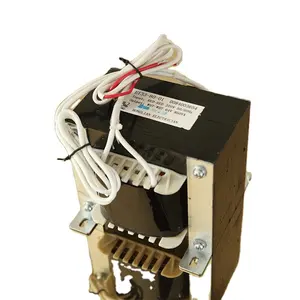
Honglian A L Factory Price AC Air Conditioner Power Air-conditioning Electric Transformer High Frequency Transformer



















Capacitors play a crucial role in the functionality of air conditioning systems. Among these, air conditioner capacitors are specialized components that ensure the smooth operation of aircon units. These capacitors are designed to store and release energy, providing the necessary jolt to start the motor while also maintaining a consistent power supply to keep it running.
The capacitor in an air conditioner is pivotal for the start and run phases of the system. It's a component that temporarily holds an electric charge, aiding in the operation of the air conditioner's motors. The capacitance, which is the ability of the capacitor to store this charge, is measured in microfarads (µF), with a range that varies according to the specific needs of the AC unit.
There are primarily two types of capacitors used in air conditioning units: the start capacitor, which gives the compressor motor the initial start-up boost, and the run capacitor, which helps the motor maintain a consistent speed. Changing a capacitor in an air conditioner may be necessary if the unit struggles to start or doesn't run efficiently. The aircon capacitor can be found in various forms, such as film, electrolytic, and supercapacitors, each serving distinct functions within the system.
Air conditioner capacitors are designed to be durable and efficient. They are crucial for the energy management of the AC unit, ensuring that the motor starts quickly and runs consistently. The advantage of a well-functioning capacitor is seen in the longevity and efficiency of the air conditioner. When it comes to maintenance, ac capacitor replacement is a common procedure that can restore the proper function of an air conditioning unit without the need to replace the entire system.
Selecting the correct capacitor is vital for the safety and efficiency of the air conditioner. Factors such as capacitance value, voltage rating, and size must be considered. While the ac capacitor cost is a factor, it is more important to ensure compatibility and adherence to the specifications of the AC unit. When a capacitor fails, it is often a straightforward task for a technician to perform an ac unit capacitor replacement, restoring the unit's functionality.
Regular maintenance of an air conditioning system includes checking the health of the capacitor. Symptoms of a failing capacitor include an air conditioner that hesitates to start, shuts off on its own, or operates inefficiently. In such cases, changing the capacitor on an air conditioner may be required. It's a cost-effective solution that can prevent further issues with the AC unit. For those with technical expertise, changing capacitor ac unit components can be a DIY task, but it is generally recommended to seek professional assistance to ensure safety and accuracy.